Understanding and Recovering from Prescription Drug Addiction

Prescription Drug Addiction
In recent years, prescription drug addiction has become a rising crisis in the United States. What often begins as a legitimate need for medication after surgery, injury, or a mental health diagnosis can sometimes evolve into a dangerous and life-threatening dependency.
At Reviving You Recovery, located in the peaceful hills of Menifee, California, we’ve seen how easily people fall into the grip of prescription drug addiction—and how powerfully they can recover with the right treatment and support.
This article is for anyone struggling with prescription drug misuse, or who has a loved one facing this issue. Understanding how addiction develops, what the most commonly abused prescription drugs are, and how to begin recovery is the first step toward reclaiming your life.
What is Prescription Drug Addiction?
Prescription drug addiction refers to the compulsive use of medications, despite harmful consequences. Unlike illegal drugs, prescription medications are often introduced into someone’s life by a doctor’s recommendation. This can make it harder for individuals and families to recognize the problem early, because it starts with something that feels safe and necessary.
Over time, tolerance builds. The body and brain become dependent on the drug to function “normally,” and stopping use can trigger painful or dangerous withdrawal symptoms. Eventually, the drug begins to control the person—not the other way around.
Commonly Abused Prescription Medications
At Reviving You Recovery, we treat clients who have become dependent on a variety of medications. While many types of prescriptions can be misused, the most common categories include:
1. Opioid Painkillers
Prescribed for moderate to severe pain, opioid medications like oxycodone (OxyContin), hydrocodone (Vicodin), and morphine are among the most addictive substances legally available. Even short-term use can lead to dependence, and prolonged use often escalates into addiction.
2. Benzodiazepines (Benzos)
Often prescribed for anxiety, insomnia, or seizures, benzos such as alprazolam (Xanax), diazepam (Valium), and lorazepam (Ativan) are central nervous system depressants. They can be dangerous when used over time or combined with alcohol or opioids.
3. Stimulants
Commonly used to treat ADHD, stimulants like amphetamine (Adderall) and methylphenidate (Ritalin) increase focus and alertness but can become addictive when used in high doses or without a prescription.
4. Sleep Medications
Drugs like zolpidem (Ambien) are often prescribed for insomnia, but can lead to psychological dependence and are sometimes misused for their sedative effects.
How Prescription Drug Addiction Happens
Addiction doesn’t discriminate. It affects people from all backgrounds, ages, and lifestyles. Many of our clients at Reviving You Recovery in Menifee never imagined they would struggle with addiction—especially not from something their doctor prescribed.
Here’s how it often begins:
- Legitimate Prescription: A person is prescribed a medication to manage pain, anxiety, or another health concern.
- Increased Tolerance: Over time, the same dose stops working as effectively. They take more than prescribed or take it more often.
- Dependence: The body and brain become reliant on the drug to feel “normal.”
- Compulsive Use: The individual begins to crave the drug and may engage in risky behaviors (e.g., doctor shopping, forging prescriptions, buying pills online).
- Addiction: Despite negative consequences—strained relationships, job loss, health issues—the person cannot stop.

Prescription drug addiction is not a moral failure. It is a medical condition that requires professional treatment.
Get Your Questions Answered Now

Signs and Symptoms of Prescription Drug Addiction
Recognizing addiction in yourself or a loved one can be challenging, especially when the drug use started with a doctor’s note. But some common red flags include:
- Taking more medication than prescribed or running out early
- Visiting multiple doctors or pharmacies to get extra prescriptions
- Lying about or hiding drug use
- Isolating from family and friends
- Mood swings, irritability, or depression
- Changes in sleep, appetite, or personal hygiene
- Trouble at work, school, or home
- Physical withdrawal symptoms (nausea, shaking, sweating) when not using
If these symptoms sound familiar, know this: You are not alone—and help is available.
The Importance of Detox and Medical Supervision
With many prescription drugs, especially opioids and benzodiazepines, withdrawal can be severe or even life-threatening. That’s why professional detox is often the first and most critical step in recovery.
At Reviving You Recovery in Menifee, our detox program is medically supervised and designed to help you safely and comfortably rid your body of harmful substances. You’ll be monitored 24/7 by experienced healthcare professionals, and medications may be used to ease symptoms and prevent complications.
Attempting to quit “cold turkey” can be dangerous, particularly with benzodiazepines or long-term opioid use. A structured detox environment ensures that you are supported physically and emotionally as your body begins to heal.
Comprehensive Treatment for Long-Term Healing
Detox alone is not enough to ensure lasting recovery. It addresses the physical side of addiction, but not the emotional, behavioral, or psychological aspects. That’s why Reviving You Recovery offers holistic, evidence-based treatment following detox.
Our treatment programs include:
1. Residential and Outpatient Care
Whether you need 24/7 support or a more flexible schedule that allows you to continue working or caring for your family, we have options. Our outpatient care programs serve both local residents in the Temecula Valley and people across Southern California.
2. Individual Therapy
Addiction is often linked to deeper mental health issues like trauma, anxiety, or depression. Through therapy, clients can explore the root causes of their addiction and develop healthy coping mechanisms.
3. Group Counseling
Sharing your journey with others who understand is a powerful part of healing. Group sessions create a sense of community and offer encouragement, accountability, and perspective.
4. Dual Diagnosis Treatment
Many individuals with prescription drug addiction also struggle with co-occurring mental health disorders. Our dual diagnosis care ensures that both conditions are treated simultaneously for the best outcomes.
5. Family Involvement
Addiction affects the whole family, not just the individual. We offer family education, therapy, and support to help loved ones heal and create healthier relationships.
6. Life Skills and Relapse Prevention
We equip clients with tools for managing stress, navigating triggers, setting boundaries, and maintaining sobriety in daily life.
Why Location Matters: Healing in Temecula Valley
Located in the scenic Temecula Valley, Reviving You Recovery offers a tranquil and private environment ideal for recovery. Menifee, California—surrounded by rolling hills, blue skies, and equestrian ranches—provides a peaceful backdrop for healing from addiction.
Nature, fresh air, and sunshine are known to reduce stress and boost mood. Many of our clients find that the calm beauty of Southern California helps them reconnect with themselves in ways that are hard to achieve in a busy or urban setting.
Life After Prescription Drug Addiction
Recovery doesn’t end when treatment does. It’s a lifelong journey of learning, growth, and self-discovery. That’s why we focus on aftercare planning and ongoing support to help clients stay connected and continue to thrive.
Life after prescription drug addiction can include:
- Renewed relationships with family and friends
- Better mental and physical health
- Improved job performance and career growth
- Higher self-esteem and confidence
- Rediscovered passions and hobbies
Our goal at Reviving You Recovery is not just to help you stop using—but to help you build a life that feels worth staying sober for.

What to Do If You or a Loved One Needs Help
If you’re struggling with prescription drug use—or watching someone you love spiral into addiction—don’t wait for things to get worse. The sooner you take action, the better the chances of recovery.
Here’s what you can do today:
- Acknowledge the problem. Denial can delay recovery for years.
- Seek professional help. Contact a treatment center like Reviving You Recovery to discuss options.
- Have a conversation. If you’re approaching a loved one, do so from a place of compassion, not judgment.
- Focus on progress, not perfection. Every small step counts.
Recovery is possible, no matter how long you’ve been struggling
Final Thoughts
Prescription drug addiction is a complex and often misunderstood condition. It can sneak up on anyone, but it doesn’t have to define the rest of your life. At Reviving You Recovery, we believe in second chances, holistic healing, and personalized care.
From medically supervised detox to outpatient therapy, our team is here to walk alongside you every step of the way. In the serene surroundings of Menifee, California, you can find clarity, connection, and hope for a brighter, sober future.
Reach out today—your recovery journey starts now.
We Accept Most Insurances
We are in network with:









We know insurance coverage can be a source of uncertainty for people. We make sure you have all the information necessary. The great news is health insurance can potentially cover the total treatment costs. If you don't have insurance, we offer cash payment options for our treatment programs and are committed to working with clients regardless of financial situations.
